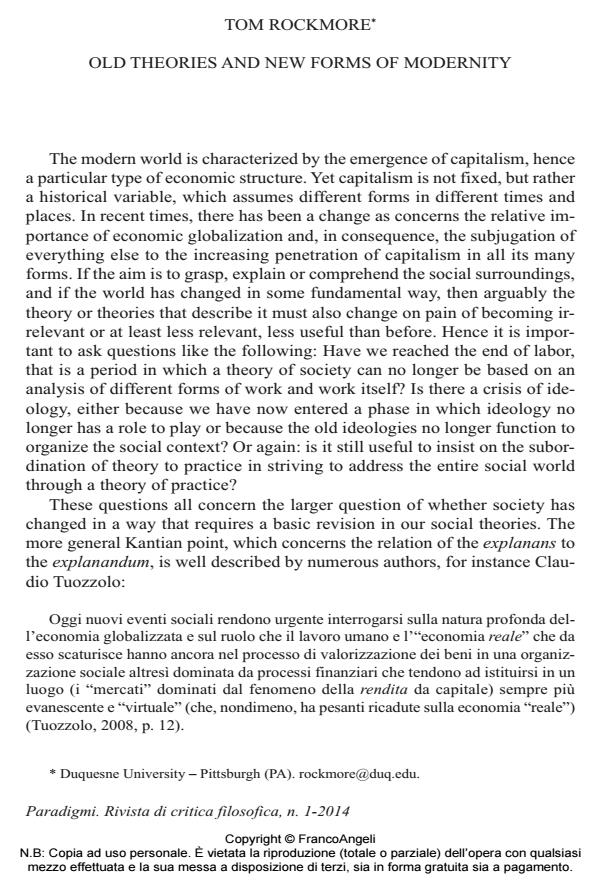Old theories and new forms of modernity
Journal title PARADIGMI
Author/s Tom Rockmore
Publishing Year 2014 Issue 2014/1 Language English
Pages 14 P. 37-50 File size 512 KB
DOI 10.3280/PARA2014-001003
DOI is like a bar code for intellectual property: to have more infomation
click here
Below, you can see the article first page
If you want to buy this article in PDF format, you can do it, following the instructions to buy download credits

FrancoAngeli is member of Publishers International Linking Association, Inc (PILA), a not-for-profit association which run the CrossRef service enabling links to and from online scholarly content.
Il mondo moderno è caratterizzato dall’emergere del capitalismo e, quindi, da un peculiare tipo di struttura economica. Eppure il capitalismo non è immobile, ma è piuttosto una variabile storica, che si manifesta in luoghi e tempi differenti. Questo contributo prende in esame il rapporto attuale tra capitalismo e teoria del capitalismo. Sarebbe un fraintendimento pensare che la posizione di Marx non possa essere riformulata e rafforzata. Anche se il marxismo sostiene che egli è riuscito a lasciarsi alle spalle l’idealismo tedesco e la filosofia, Marx, di fatto, non ha abbandonato l’idealismo tedesco, che rimane la fonte delle sue più significative intuizioni, ma anche, specialmente per ciò che concerne l’idea di sistema, l’aspetto più problematico.
Keywords: Marx, capitalism, globalization, idealism, theory, system.
- Hegel G.W.F. (1801). Differenz des Fichteschen und Schellingschen Systems der Philosophie. In: Werke Bd. 2. Frankfurt a.M.: Suhrkamp, 1970: 7-138 (trad. it.: Differenza tra il sistema filosofico di Fichte e quello di Schelling. In: Primi scritti critici. Milano: Mursia, 1971: 1-114).
- Marx K. (1844). Ökonomisch-philosophische Manuskripte aus dem Jahre 1844. Ora in: Marx-Engels-Werke. Ergänzungsband 1. Berlin: Dietz, 1989: 465-588 (trad. it.: Manoscritti economico-filosofici del 1844. In: Opere Complete, vol. III. Roma: Editori Riuniti, 1976: 249-376).
- Marx K. (1857-58). Grundrisse der Kritik der politischen Ökonomie (Rohentwurf). Berlin: Dietz, 1974 (trad. it.: Lineamenti fondamentali della critica dell’economia politica, vol. I. Firenze: La Nuova Italia, 1969).
- Marx K. (1859). Vorwort. Zur Kritik der politischen Ökonomie. In: Marx-Engels-Werke. Das Kapital I. Berlin: Dietz, 1989 (trad. it.: Introduzione alla critica dell’economia politica. Roma: Edizioni Rinascita, 1954).
- Marx K. (1867). Das Kapital. In: Marx-Engels-Werke. Das Kapital I-III. Berlin: Dietz, 1989 (Engl. trans.: Capital 3 vols. New York: International Publishers, 1975; trad. it.: Il Capitale, 3 tomi. Roma: Editori Riuniti, 1951-52).
- Marx K. and Engels F. (1845-47). Die deutsche Ideologie. In: Marx-Engels-Werke. Schriften und Artikel 3. Berlin: Dietz, 1989: 5-530 (trad. it.: L’ideologia tedesca.
- In: Opere Complete, vol. V, Roma: Editori Riuniti, 1972: 7-574).
- Marx K. and Engels F. (1848). Manifest der Kommunistischen Partei. London (Engl. trans.: Manifesto of the Communist Party. In: Classics of Moral and Political Theory , Indianapolis: Hackett, 1992: 1183-1202; trad. it.: Il manifesto del Partito comunista . Roma: Edizioni Rinascita, 1954).
- Tuozzolo C. (2008). “Marx Possible”. Benedetto Croce teorico marxista 1896-1897. Milano: Franco Angeli.
Tom Rockmore, Old theories and new forms of modernity in "PARADIGMI" 1/2014, pp 37-50, DOI: 10.3280/PARA2014-001003